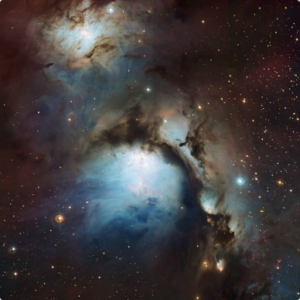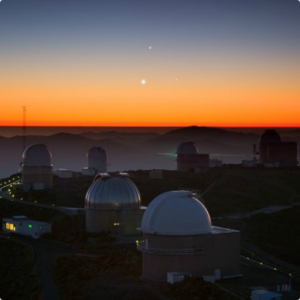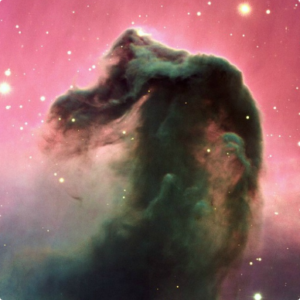Bachelor in Astronomy
¿Por qué estudiar Astronomía en la UC?
La astronomía es una de las ciencias más antiguas y al mismo tiempo, más cercanas al ciudadano común. ¿Quién no se ha maravillado ante el grandioso espectáculo de una noche estrellada en el campo o la playa? En pleno siglo XXI, la astronomía es una ciencia a escala planetaria: un astrónomo puede comunicarse prácticamente con otro astrónomo en cualquier parte del mundo y compartir sus avances y descubrimientos, sin importar su nacionalidad, religión u origen. Vivimos en una época en la cual los siete mil millones de habitantes del planeta están expectantes por descubrimientos astronómicos extraordinarios. Por ejemplo, hay más de mil exoplanetas y existen cientos de astrónomos trabajando para encontrar atmósferas y ojalá trazas de vida en algunos de ellos. Gracias a telescopios gigantescos, que escudriñan el espacio en todo el espectro electromagnético, es posible examinar galaxias cuya luz fue emitida cuando el universo tenía menos de un 5% de su edad actual y nuestro sistema solar aún no se había formado.
Lo más extraordinario es, sin duda, que Chile es el actor principal de esta aventura astronómica. Más del 70% de los telescopios del planeta están en nuestro país y en los próximos años se construirán aún más instrumentos. Los jóvenes deben ser parte de esta aventura de descubrimientos cósmicos. La astronomía en Chile se ha desarrollado rápidamente; existen los medios, los astrónomos y los recursos para ser protagonistas de la astronomía profesional en Chile, con grandes expectativas de desarrollo. En este escenario el Instituto de Astrofísica (IA) de la Pontificia Universidad Católica de Chile es líder en el país.
Con una planta de dedicación exclusiva para la investigación y la docencia de 15 profesores, alrededor de 40 investigadores postdoctorales, más de 35 alumnos de postgrado (magíster y doctorado) y unos 120 alumnos de pregrado, el IA se ha transformado en un centro líder de la astrofísica en Chile y Latinoamérica. El IA mantiene convenios con más de diez prestigiosas universidades y centros de investigación a escala mundial, entre ellos las universidades de Princeton, Columbia, Notre Dame, Padova, Maryland, Heidelberg, entre otros. En Chile los investigadores lideran las áreas de astronomía extragaláctica, exoplanetas, instrumentación astronómica en óptico e infrarrojo y astronomía estelar. Al mismo tiempo, existe un grupo muy potente de astrofísica teórica y computacional con aplicaciones en cosmología, formación de galaxias y astrofísica estelar, haciendo uso de un supercomputador que está instalado en el IA. Varios de los académicos del Instituto han sido ganadores de la prestigiosa beca de la fundación John Simon Guggenheim y muchos han liderado proyectos a nivel nacional e internacional, sin mencionar que todos ellos han sido investigadores principales de proyectos FONDECYT regulares.
El IA además ha jugado un rol preponderante en la fundación y operación del Centro de Astro-Ingeniería UC (AIUC), el primer centro en Chile dedicado exclusivamente al diseño y operación de instrumentación astronómica avanzada, incluyendo óptica adaptativa, espectroscopia infrarroja, receptores y antenas en el sub-milimétrico, etc.
El campo laboral de los egresados de Licenciatura en Astronomía está especialmente diseñado para que un alumno aventajado pueda competir significativamente con sus pares a nivel internacional y optar a los mejores postgrados en Astrofísica de Chile y el mundo para continuar con la carrera de la astrofísica profesional. Además, después de la licenciatura se pueden recorrer caminos que se insertan en otros quehaceres de la astrofísica como la educación, la difusión científica, entre otros. Los egresados del postgrado del IA, especialmente aquellos que han optado por el programa de PhD, pueden ingresar al mundo profesional siendo reconocidos como investigadores de talante internacional; trabajando como investigadores postdoctorales, académicos en universidades, o investigadores en prestigiosos centros de investigación a lo largo y ancho del mundo, incluyendo observatorios astronómicos en Chile.
*Fotos: Eso.org
The Licenciate degree in Astronomy at the Universidad Católica de Chile began in 1998, motivated by the great potential development of this science in Chile, coupled with the shortage of astronomers who can join in this development.
It is currently the only degree program in Astronomy with direct once finished the secondary education (taking the University Selection Test, PSU). Since its inception, the program is attracting some of the best students in the scientific area of the country.
Academic degree
Academic degree of Bachelor.
Academic degree in Astronomy.
Career Objectives
The objective of the Bachelor in Astronomy is to provide a solid and deep foundation in mathematics, physics and astronomy, allowing its graduates successfully pursue graduate studies in astrophysics, physics or related areas, or serve in areas of advanced technology that benefit from an important scientific training, for example in international observatories.
Study plan
The curriculum of the Bachelor in Astronomy includes courses in astronomy, physics, mathematics and computing, which give students a solid scientific training that can be used in many different contexts. The similarity of the curriculum (particularly the first two years) with other programs offered by the university, such as Bachelor of Engineering and Physics, facilitates change between these careers to students who do not have their well-defined vocation when they apply and even allows students with exceptional performance to take the degree in Astronomy in parallel with another degree.
For students whose primary interest is the engineering career or some other physical-mathematical basis, but wish to supplement with a base in astronomy, is the possibility to follow the Academic Certificate in Astronomy, a sequence of four courses extracted of the degree program .
UC astronomer profile
The graduate of the Bachelor in Astronomy at the Universidad Católica acquired a range of skills as a result of their training, which are listed and described below:
- Know and understand the core subjects of physics and astronomy, enabling you to apply them to solving problems, which uses physical tools, mathematical and computational methods.
- He knows that a theory must be verified experimentally, therefore knows and understands the experimental and observational techniques, being thus able to perform experiments and analyze observations aimed at this goal. It is also able to learn the operation of new instruments and new technologies.
- It has strong values expressed in his act with responsibility and professional ethics. It is also respectful of people and has a vocation of service. It has the ability to work together to achieve a goal and self-learning if needed. It is persistent, rigorous and able to work under pressure.
- The acquired knowledge allows him to join graduate programs in both astrophysics, as in physics, engineering, mathematics, chemistry, biophysics, earth sciences and other related areas. You can also complete studies of pedagogy.
Work field
Astronomy is a truly international career, allowing its practitioners to work anywhere in the world and maintain contacts with scientists from many other places. In Chile, the strong development of the observatories is creating excellent opportunities, which require to be taken advantage of multiplying by 10 the current number of astronomers. New astronomers can work in:
- Apply for a graduate in Astronomy / Astrophysics at some of Chilean universities that offer Master’s or PhD in Astronomy / Astrophysics, or in a foreign university. Students graduate with a degree in Astrophysics and good performance have a high probability of being accepted into a graduate program abroad and in Chile.
- Astronomical observatories, which require high-level specialized to operate, maintain and improve the increasingly complex operating systems of telescopes and instruments attached to them staff. National and international institutions specialized in research, as the Gemini project, NASA, specialized government agencies and others.
- High-tech industries.
In each of these possibilities, there are positions that require varying levels of experience and postgraduate training.
Applicants:
- Interest and curiosity about the cosmos phenomena.
- Strong motivation for science subjects.
- Capacity of criticism and interpretation of natural phenomena observation.
- Developed mathematical aptitude.
- Ability to perform abstract studies.
- Willingness for individual and team work.
Admission (Key number 1232):
You can enter this degree by regular admission (any student who has completed his secondary education in Chile), taking the University Selection Test (PSU).
For more details about the admission process click here.
For details about the fees and scholarships click here.


